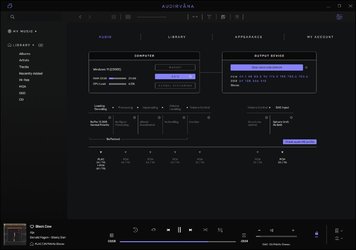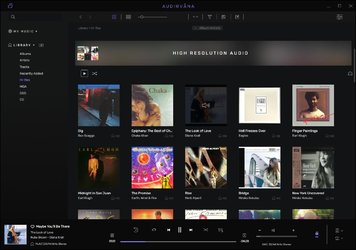As long as it scores pretty high on the FTEI (Foot Tapping Experience Index) it can't really be bad.

Personally, I, stick to foobar2000 with WASAPI and Hi Rez FLAC files simply because the XMOS USB interface implementation in my DAC is audibly immune to input jitter and electronic noise patterns─the clock jitter inherent of the computer's USB controller hardware combined with the typical anti-musical effects caused by EMI/RFI coming from all the various PC hardware components─that ride the data lines of the cable between my laptop's USB 2.0 port and it, and that can propagate onto the more sensitive, analogue, intestines of the DAC especially if the design implementation doesn't include proper specific isolation in this regard.
My DAC uses 2.5 volts for the stereo output signal that comes out of its RCA connectors. Had there been any USB noise there that can be possible to audibly be discerned, then certainly, I would have heard it soon enough, after I hooked this DAC up directly to my Emotiva XPA-2 Gen1 amp with no preamp or anything between. With my ear close to the ceramic (aluminum oxide) dome tweeter of one of my big floorstanding speakers that are linear to 37.5kHz, there's nothing but utter silence according to me and everyone else who has listened carefully to my setup.
When I say 'carefully', I don't mean rapid A/B switching, or ABX testing. Human hearing just doesn't work that way, as an important part of the music listening experience doesn't 'reach' the listener right away, in fact it may take up to 10-15 minutes, maybe longer, before a person starts to listen fully into the acoustic space, which any music lover who has ever entered a concert hall will probably already know is true.
This is how I know for sure that the electronic noise patterns from the USB are buried very deeply below the actual noise floor of my playback chain, as nobody I know has been able to hear it, even, when there was no volume control present, that could be used to attenuate it like happens in a normal playback system. Having 135dB Dynamic Range in a DAC may be viewed as overkill, but with the right amp and speakers it does allow you to verify by listening with your own ears that no noise is leaking into the DAC through its USB input, which matters because the XMOS is just a brand name, the actual
implementation of the XMOS can still vary a lot in quality between different DACs.
Similarly, the ESS SABRE ES9018 is highly susceptible to electronic noise, so the implementation of it is what tends to matter equally as much as the actual chip itself, which helps to explain why so many audiophiles have repeatedly said that SABRE DACs sound both artificial and harsh. It's because there aren't too many SABRE DACs out there that use the ES9018 chip in such a particular way that the mangnitude of the combined effect caused by clock jitter and electronic noise propagation gets rejected through being well-engineered with things like good isolation transformers, good metal shielding also between the input interface board and the main board inside the DAC, and an ultra-low noise power supply that uses 11 rails with dual toroidal power transformers.
In short, voltage regulators alone don't cut it, at least not if you're talking real palpable stereo Hi Fi digital audio playback through a DAC hooked up to a computer─in my own personal opinion and contrary to popular belief anyway. That's why so many audio buffs like to compare different software players even though they already know that the playback is still bitperfect with each one, it's because the DAC that they bought isn't capable to use bitperfect-ness to its fullest potential when it comes to input jitter immunity, 'PC noise' rejection, a clean power signal, etc. which I find to be of much more value musically when compared to performing all sorts of semi-popular remedies each one of which, even in those cases where it does have some positive effects that can potentially also be blatant, still fails to address the root cause of the problem, unfortunately.
'Unfortunately', as IMO (and IME) there can be no valid excuse for persistently keep wanting to overlook these important details I mean, once you've learned these basic truths, you can't very easily un-learn them. In the Dutch language, we have a saying, "Wat baten kaars en bril als de uil niet zien wil". Not trying to point any fingers here. But it means "If somebody doesn't want to learn or cooperate, there's no use in helping him or her to do so". My point is, even though audio is part subjectiveness, part science, software cannot necessarily always be used to fix a hardware limitation, but it certainly can help─only it depends very heavily on what the limitations
factually are like.












